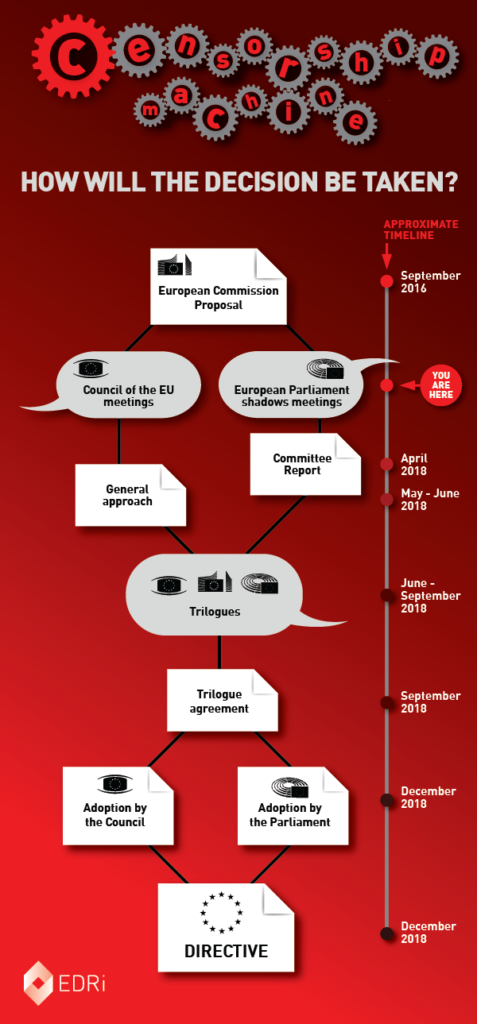#CensorshipMachine – How will the decision be taken?
The European Union (EU) is currently reforming its copyright legislation. In September 2016, the European Commission proposed its controversial draft for the new Copyright Directive that includes de facto mandatory upload filters (Article 13).
This is how the process to approve this “censorship machine” will advance, from the Commission’s proposal until the adoption of the Directive:
European Commission
The European Commission launched its dreadful proposal in September 2016. This was done under the responsibility of a Commissioner who called net neutrality activists “Taliban-like”, a Commission Vice-President who called anti-acta activists tin-hat wearing mushroom eaters and a head of Unit that is a former music industry lobbyist. The proposal was then sent to the Council of the European Union (the 28 EU Member States) and the European Parliament.
Council of the European Union
In the Council work is underway, under extreme pressure from the Commission, to find a “general approach” with which it can negotiate with the European Parliament. The proposals for a “general approach” that have been put forward have all been the same, and sometimes even worse, than the European Commission’s initial proposal.
European Parliament
In the European Parliament, the Committee on Legal Affairs (JURI) appointed hard-working Maltese Member of the European Parliment (MEP) Therese Comodini Cachia to manage the process. Ms Comodini went far beyond the call of duty to meet all stakeholders (she published a list of 104 meetings with various interests in her draft report), to go to every possible conferences and work to produce a fair outcome for Europe. She produced a draft position in March of 2017 that was an honest – albeit incomplete – effort to find a reasonable compromise. She was then elected to the Maltese Parliament and left Brussels. She was replaced by Axel Voss MEP, a German conservative, who is a fan of upload filtering, restrictions of linking online, and so on. This sudden change of direction has slowed down progress in the Parliament.
In the European Parliament, instead of voting for amendments tabled by Parliamentarians, there are closed-door “shadows meetings”, without minutes, that seek to merge amendments to reach a broader consensus. Exceptionally, the draft compromises are being made available, albeit unofficially, by Parliamentarians in the copyright discussions. Once these “compromise amendments” receive enough support, they are finalised and, in the Committee vote, they are then voted first, meaning that it is almost impossible for them not to be adopted. The Committee then votes to give itself a mandate to negotiate directly with the Council in the so-called “trilogue” process. This vote is expected on 23-24 April 2018.
“Trilogues” – reaching a final deal
Once the Parliament and Council have their respective positions (the Council “general approach” and the Parliament committee “report”), another round of closed-door meetings take place, this time between the institutions. These happen under the “neutral” guidance of the European Commission. These meetings continue for an indeterminate amount of time. Often, the end of the rotating six-month Council Presidency is used to create false urgency to push both sides to reach a compromise, commonly involving late-night meetings.
Once the agreement has been reached, some months pass while the agreed text is put into more correct legal language and translated into all official languages. Then, months after negotiations have finished, the Parliament and Council get to formally vote to adopt the agreed text.

Trilogues and democracy
Even though “trilogues” started off by being the exception rather than the rule for EU decision-making, most of the legislation of the European Union (EU) is now adopted using this process. This is worrisome, because the process lacks accountability and transparency. Trilogues squeeze democracy out of the EU decision-making process because…
- Despite being hugely important in the decision-making process, the European Parliament Committee vote seems too minor and early for citizens to become motivated to get involved, and to express their opinion to the Parliamentarians.
- The trilogue process is secret (although, more documents than usual are being released in this case) and has no clear end-date around which to mobilise. It is too nebulous for people to become motivated to get involved, by talking to their MEPs or parliamentarians, for example.
- The conclusion of the trilogue is “just an informal agreement”. It is not firm enough for people to become motivated and get involved. For the same reason, it is not likely to generate press interest and get visibility in the media. At this stage, if the agreement is bad, it is time to make sure that Parliamentarians know that the deal is controversial – and not wait for months until the final vote is scheduled.
- The final vote in Parliament takes place months after the deal was done. It is definitely exciting enough for people to mobilise and have their say, but overturning a months-old agreement that has already been discussed and approved by the majority of EU political groups is a gargantuan task, so it is more than probable that the trilogue deal is there to stay.
Not least because there are European Parliament elections in May 2019, it is valuable for citizens to make their feelings known to their MEPs at every stage of the process. The coming weeks are crucial – the European Parliament’s Committee on Legal Affairs (JURI) will be voting on the upload filter on 23-24 April. Check out here who are your representatives that are part of the Committee and how to contact them: https://edri.org/proposed-internet-filter-will-turn-platforms-against-users/
Deconstructing the Article 13 of the Copyright proposal of the European Commission
https://edri.org/files/copyright/copyright_proposal_article13.pdf
New Estonian Presidency “compromise” creates copyright chaos (03.11.2017)
https://edri.org/new-estonian-presidency-compromise-creates-copyright-chaos/
(Contribution by Joe McNamee, EDRi)

